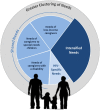Caregiver supportive policies to improve child outcomes in the wake of the HIV/AIDS epidemic: an analysis of the gap between what is needed and what is available in 25 high prevalence countries
- PMID: 27392009
- PMCID: PMC4991222
- DOI: 10.1080/09540121.2016.1176685
Caregiver supportive policies to improve child outcomes in the wake of the HIV/AIDS epidemic: an analysis of the gap between what is needed and what is available in 25 high prevalence countries
Abstract
In the wake of the HIV/AIDS epidemic, caregivers are struggling to support HIV-affected children. For reasons of equity and efficiency, their needs can be best met through strong social protections and policies. This paper presents a conceptual framework to help address the needs of HIV-affected caregivers and to prioritize policies. We describe the needs that are common across diverse caregiving populations (e.g., economic security); the needs which are intensified (e.g., leave to care for sick children) or unique to providing care to HIV-affected children (e.g., ARV treatment). The paper then explores the types of social policies that would facilitate families meeting these needs. We outline a basic package of policies that would support HIV-affected families, and would meet goals agreed to by national governments. We examine the availability of these policies in 25 highly affected countries in sub-Saharan Africa. The majority of countries guarantee short-term income protection during illness, free primary school, and educational inclusion of children with special needs. However, there are significant gaps in areas critical to family economic security and healthy child development. Fewer than half of the countries we analyzed guarantee a minimum wage that will enable families to escape poverty; only six have eliminated tuition fees for secondary school; and only three offer paid leave to care for sick children. Filling these policy gaps, as well as making mental health and social services more widely available, is essential to support caregiving by families for HIV-affected children. As part of the HIV agenda, the global community can help national governments advance towards their policy targets. This would provide meaningful protection for families affected by HIV, as well as for millions of other vulnerable families and children across the region.
Keywords: HIV-affected children; HIV/AIDS; caregiving; social policy.
Figures
Similar articles
-
National and state policies influencing the care of children affected by AIDS.Child Adolesc Psychiatr Clin N Am. 2000 Apr;9(2):425-49. Child Adolesc Psychiatr Clin N Am. 2000. PMID: 10768076 Review.
-
[Community organizations and fighting STDs, HIV and AIDS in Montreal: lessons for sub-Saharan Africa].Sante. 2010 Apr-Jun;20(2):116-24. doi: 10.1684/san.2010.0185. Epub 2010 Aug 5. Sante. 2010. PMID: 20685643 French.
-
HIV/AIDS, income loss and economic survival in Botswana.AIDS Care. 2006 Oct;18(7):656-62. doi: 10.1080/09540120500287010. AIDS Care. 2006. PMID: 16971272
-
Children affected by HIV.Child Health Dialogue. 1998;(12):3. Child Health Dialogue. 1998. PMID: 12294835
-
Strengthening families to support children affected by HIV and AIDS.AIDS Care. 2009;21 Suppl 1(S1):3-12. doi: 10.1080/09540120902923121. AIDS Care. 2009. PMID: 22380973 Free PMC article. Review.
Cited by
-
Child functioning and disability in children living with human immunodeficiency virus in a semi-rural healthcare setting in South Africa.Afr J Prim Health Care Fam Med. 2020 Jul 30;12(1):e1-e8. doi: 10.4102/phcfm.v12i1.2259. Afr J Prim Health Care Fam Med. 2020. PMID: 32787406 Free PMC article.
-
Children and HIV - a hop (hopefully), a skip (lamentably) and a jump (ideally)?AIDS Care. 2016 Mar;28 Suppl 2(sup2):1-6. doi: 10.1080/09540121.2016.1176688. AIDS Care. 2016. PMID: 27391992 Free PMC article. No abstract available.
-
A phenomenological study of the beliefs of family caregivers of children living with HIV/AIDS on adherence to antiretroviral therapy.Nurs Open. 2023 Sep;10(9):6117-6124. doi: 10.1002/nop2.1833. Epub 2023 May 20. Nurs Open. 2023. PMID: 37209366 Free PMC article.
-
The Effect of Community-Based Nutritional Interventions on Children of Women Living With Human Immunodeficiency Virus in Rural India: A 2 × 2 Factorial Intervention Trial.Clin Infect Dis. 2020 Sep 12;71(6):1539-1546. doi: 10.1093/cid/ciz1009. Clin Infect Dis. 2020. PMID: 31608373 Free PMC article.
-
Burden of caring for children living with human immunodeficiency virus in a semi-rural South African community.S Afr Fam Pract (2004). 2020 Jun 25;62(1):e1-e5. doi: 10.4102/safp.v62i1.5110. S Afr Fam Pract (2004). 2020. PMID: 32633994 Free PMC article.
References
-
- Aantjes C., Quinlan T., Bunders J. Integration of community home based care programmes within national primary health care revitalisation strategies in Ethiopia, Malawi, South-Africa and Zambia: A comparative assessment. Globalization and Health. 2014:85. doi: 10.1186/s12992-014-0085-5. - DOI - PMC - PubMed
-
- Alaniz E., Gindling T. H., Terrell K. The impact of minimum wages on wages, work and poverty in Nicaragua. Labour Economics. 2011:S45–S59. doi: 10.1016/j.labeco.2011.06.010. - DOI
-
- Bachman DeSilva M., Beard J., Cakwe M., McCoy K., Nkosi B., Parikh A., Simon J. Vulnerability of orphan caregivers vs. non-orphan caregivers in KwaZulu-Natal. Vulnerable Children and Youth Studies. 2008;(2):102–111. doi: 10.1080/17450120701868411. - DOI
MeSH terms
LinkOut - more resources
Full Text Sources
Other Literature Sources
Medical
Research Materials
Miscellaneous

